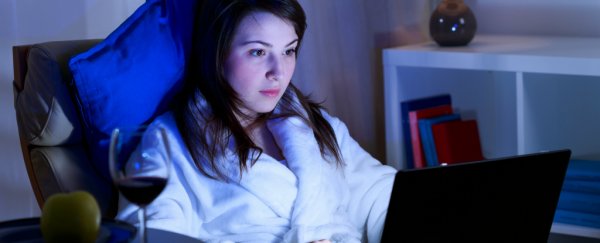Any night owls reading this will be familiar with the struggle of constantly trying to fit into a morning person's world. And now researchers say they've finally identified the genetic typo that causes this social jetlag.
A new study has revealed that many people who stay up late and struggle to wake up in the morning aren't lazy, their internal clock is simply genetically programmed to run between 2 and 2.5 hours slower than the rest of the population, thanks to a mutation in a body clock gene called CRY1.
"Carriers of the mutation have longer days than the planet gives them, so they are essentially playing catch-up for their entire lives," says lead researcher Alina Patke from The Rockefeller University in New York.
To be clear, we're not just talking about anyone with a smartphone addiction who struggles to fall asleep at night.
True night owls are people who, even in the absence of smartphones and electrical lights, will still fall asleep and wake up late. In contrast, most people who go camping away from city lights will generally time their sleep with the rising and setting of the Sun after a few days.
Night owls who struggle to get enough sleep are often diagnosed at sleep clinics with delayed sleep phase disorder (DSPD), and researchers estimate that around 10 percent of the global population is affected by this condition.
In addition to being more tired, people with DSPD suffer a raft of health issues because their body is constantly trying to play catch-up with the timeline set by the rest of society.
The condition has been linked to anxiety, depression, cardiovascular disease, and diabetes. Not to mention the constant frustration of being traumatised by the alarm clock each morning.
"It's as if these people have perpetual jet lag, moving eastward every day," said one of the researchers, Michael Young. "In the morning, they're not ready for the next day to arrive."
Now the team has shown that it's not just the fact that these people's body clocks are set later than other people's - they actually run 2 to 2.5 hours slower on average than the rest of the population.
Generally, the human body clock is around 24 hours, which means things like digestion, sleep, and cellular repair all fit in nicely to a standard Earth day. But thanks to a mutation in the CRY1 gene, the new research suggests some people simply need more time.
Patke and her colleagues first identified this genetic mutation seven years ago, when a 46-year-old woman came into the sleep clinic after struggling with her late sleep cycle.
Even after being placed in an apartment without windows, TV, or internet for two weeks, the woman still had a strangely long 25-hour circadian rhythm, and her sleep was fragmented.
After studying her genes, the team found that she had a single-letter mutation in the CRY1 gene, which they suspected could be causing the issue.
For a little background - our circadian clock begins each day by building up proteins, called activators, in our cells.
These activators produce their own inhibitors that, over time, stop the activators from working. When all the activators in a cell have been silenced, the inhibitors are no longer produced and gradually the activators surge again, starting the cycle for the next day once more.
The protein produced by the CRY1 gene is one of these inhibitors. But scientists still weren't sure how a single variant in the gene could be having such extreme effects on this woman's body clock.
In this latest study, the researchers took things a step further and studied the CRY1 genes in skin cells from the woman's extended family - showing that they all had the same mutation.
Further investigation revealed that the change causes a big chunk of the resulting protein to be missing, which means the inhibiting CRY1 protein becomes overly active and suppresses the activator for longer than it's supposed to, stretching the daily cycle of the cells out.
The team then backed up their research by analysing the sleep patterns of six Turkish families - 39 of the participants had DSPD and carried the CRY1 'night owl' mutation, and 31 didn't have either.
The carriers all had delayed sleep onset times and some of them had fractured, irregular sleep patterns.
For the 31 people without the genetic mutation, the midpoint of sleep was 4am, but for people with the gene, it was between 6 and 8am - which suggests the mutation pushed the body clock back at least 2 hours.
The good news in all of this is that our body clock, including CRY1, is controlled by external cues such as light exposure, so people should be able to effectively manage DSPD if they stick to a controlled routine.
"An external cycle and good sleep hygiene can help force a slow-running clock to accommodate a 24-hour day," says Patke. "We just have to work harder at it."
"It's not inconceivable that one might develop drugs in the future based on this mechanism," she added.
The researchers also made it clear that not all cases of DSPD are caused by this genetic mutation - often there are other factors involved - but the researchers found it in 1 in 75 individuals of non-Finnish, European ancestry in their research.
"Our variant has an effect on a large fraction of the population," said Young.
More research now needs to be done to replicate these results in a larger sample size, and to get an idea of whether this genetic mutation affects other bodily functions in addition to sleep.
The research has been published in Cell.
